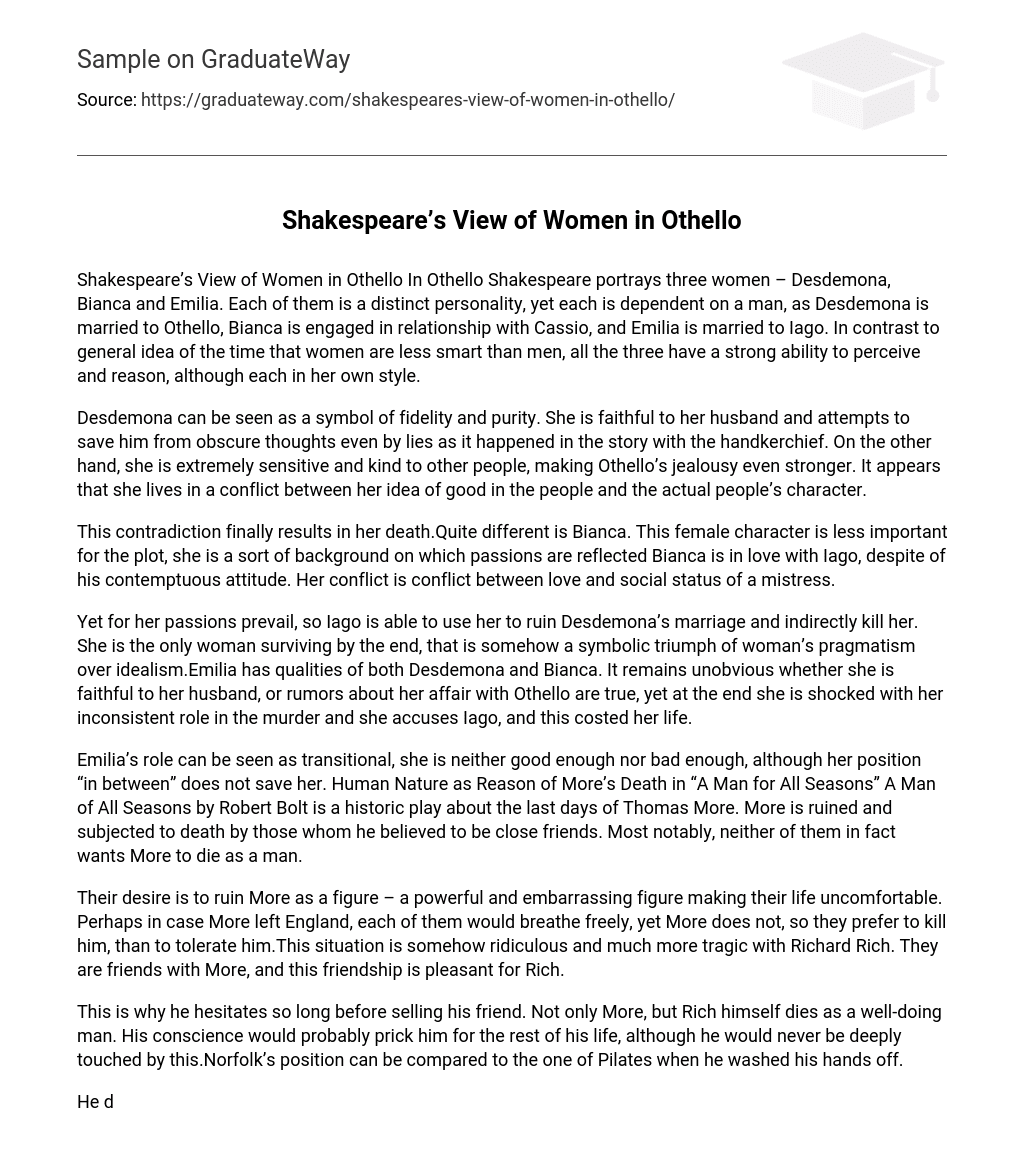Shakespeare’s View of Women in Othello In Othello Shakespeare portrays three women – Desdemona, Bianca and Emilia. Each of them is a distinct personality, yet each is dependent on a man, as Desdemona is married to Othello, Bianca is engaged in relationship with Cassio, and Emilia is married to Iago. In contrast to general idea of the time that women are less smart than men, all the three have a strong ability to perceive and reason, although each in her own style.
Desdemona can be seen as a symbol of fidelity and purity. She is faithful to her husband and attempts to save him from obscure thoughts even by lies as it happened in the story with the handkerchief. On the other hand, she is extremely sensitive and kind to other people, making Othello’s jealousy even stronger. It appears that she lives in a conflict between her idea of good in the people and the actual people’s character.
This contradiction finally results in her death.Quite different is Bianca. This female character is less important for the plot, she is a sort of background on which passions are reflected Bianca is in love with Iago, despite of his contemptuous attitude. Her conflict is conflict between love and social status of a mistress.
Yet for her passions prevail, so Iago is able to use her to ruin Desdemona’s marriage and indirectly kill her. She is the only woman surviving by the end, that is somehow a symbolic triumph of woman’s pragmatism over idealism.Emilia has qualities of both Desdemona and Bianca. It remains unobvious whether she is faithful to her husband, or rumors about her affair with Othello are true, yet at the end she is shocked with her inconsistent role in the murder and she accuses Iago, and this costed her life.
Emilia’s role can be seen as transitional, she is neither good enough nor bad enough, although her position “in between” does not save her. Human Nature as Reason of More’s Death in “A Man for All Seasons” A Man of All Seasons by Robert Bolt is a historic play about the last days of Thomas More. More is ruined and subjected to death by those whom he believed to be close friends. Most notably, neither of them in fact wants More to die as a man.
Their desire is to ruin More as a figure – a powerful and embarrassing figure making their life uncomfortable. Perhaps in case More left England, each of them would breathe freely, yet More does not, so they prefer to kill him, than to tolerate him.This situation is somehow ridiculous and much more tragic with Richard Rich. They are friends with More, and this friendship is pleasant for Rich.
This is why he hesitates so long before selling his friend. Not only More, but Rich himself dies as a well-doing man. His conscience would probably prick him for the rest of his life, although he would never be deeply touched by this.Norfolk’s position can be compared to the one of Pilates when he washed his hands off.
He does not desire More’s death, he is rather unwilling to save him because of concerns about consequences for himself. More refused to sign the Act of Succession despite all Norfolk’s attempts to persuade him, and Norfolk can not imagine why should he save this stubborn man.For Cromwell the reason to ruin More is envy and intention to take his place. He is just removing a barrier on his way to power.
As regards the source of power – Henry VIII, the royal order to judge More results from More’s position that contradicts with the position of the king. Neither of the protagonists hates More, yet for each of the it would be desirable to remove More, so they do not find a better solution than to execute him. Importance of Theater as a School of Life All of the readings we have studied are moralistic. They tell about human nature, passions and intents leading men through their life, as well as demonstrate how different they can be, and how a failure to understand the difference between own idea of good and bad and the idea of another individual can cause personal and social ruination.
With all her sensitivity, Desdemona is unable to see evil so close to her, because she is simply unable to believe that humans can be evil. More’s friends commit an actual murder out of intentions that might seem meaningless to More himself. Yet More is killed by those intentions of which he could never think that they can turn his friends into enemies.The authors wrote their works in their times, among other issues, as didactic treatises, and although the action takes place many years ago, the issues raised in those works remain highly topical for us today.
As history shows, human nature never changes, and this means that there is a chance for us today to face the situations that Shakespeare’s characters once faced, yet in case we recognize those situations, we have a chance to make a proper choice and avoid evil.





